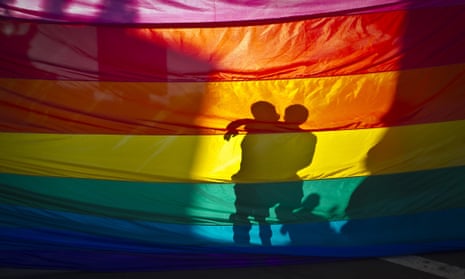Voters in the Irish Republic will decide whether to approve same-sex marriage on 22 May after the Taoiseach announced the date for a referendum.
Enda Kenny announced the date that voters in the republic will cast their ballots during an interview on RTÉ television on Thursday night.
He said the referendum would underline Ireland’s reputation as a tolerant and inclusive nation.
Kenny said that most members of the Irish parliament were in favour of same-sex marriage and that he hoped support for the referendum would be maintained.
The proposal to be put to Irish voters will read: “Marriage may be contracted in accordance with law by two persons without distinction as to their sex.”
Justice minister Frances Fitzgerald described the wording of the referendum as “clear and precise”.
The referendum was backed by both Fianna Fáil and Sinn Féin last month.
The decision to hold the vote was announced shortly before Christmas by deputy prime minister and Irish Labour leader Joan Burton.
“The fact that this referendum is now to take place is a mark of the progress that has taken place in this country in recent years and decades, and indicates the extent to which attitudes to lesbian and gay people have changed,” Burton said at the time.
Last month, health minister Leo Varadkar became the first member of a government in Dublin to say publicly he is gay.
His decision to reveal his sexuality was influenced by a desire to be “fully honest” with the Irish people.
“I felt as a public figure I should say it,” Varadkar said in a radio interview. “I want the next generation to feel that they don’t have to do an interview like this.”
His political opponents praised Varadkar’s decision to come out, with Pádraig Mac Lochlainn, of Sinn Féin, saying: “Hopefully 2015 will be another milestone in equality for our LGBT citizens.”
An opinion poll published in the Irish Times late last year found more than two thirds of voters would back gay marriage in a referendum.
However, the Catholic church has opposed legalising same-sex unions in the Republic. A yes vote would be another defeat for the church in a country it once dominated.
Dr Richard O’Leary, chair of the Church of Ireland gay group Changing Attitude Ireland, welcomed the decision to hold the vote but noted that Christians would be “campaigning on both sides”.
Voters will also be asked to approve a constitutional reform to allow younger candidates to stand for the Irish presidency. A yes vote would lower the minimum age from 35 to 21.

Comments (…)
Sign in or create your Guardian account to join the discussion